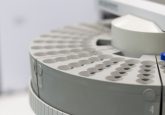Antibody ink shows promise for printable diagnostic tests

A team led by Mariana Medina-Sánchez, a postdoctoral researcher at the Leibniz Institute for Solid State and Materials Research (Dresden, Germany), has developed a printed transistor using an inkjet printer and a specially designed ink that could someday present a valuable diagnostic tool to fight disease. Their findings were published in the journal, Advanced Functional Materials.
Transistors are easily switched on or off in response to applied voltage, bridging the gap between two terminals and allowing electric current to flow between them. However, as Medina-Sánchez explained, transistors can be calibrated to respond to other triggers. She and her colleagues developed a transistor that is designed to switch on when it detects the protein biomarkers of common diseases.
The transistor was printed by Medina-Sánchez’s team using an ink embedded with human immunoglobulin G, an antibody that binds to antigens from a variety of common human pathogens such as viruses, fungi and bacteria. When a disease antigen binds to an antibody in the ink, it changes the electrical properties of the transistor. The change of electrical property alters the voltage level at which the transistor turns on. In their report, the team claimed that this technology could eventually be used by doctors, who would print sheets of the devices equipped with different protein biomarkers for disease diagnosis.
Tony Turner, head of the biosensors and bioelectronics Centre at Linköping University (Sweden), described the process as an impressive combination of the sophistication of electrochemical biosensors with a simple manufacturing technique. “Interference due to pH changes in real samples might be a problem for them,” he warned, “but overall, mobile diagnostics for healthcare, food safety and environmental monitoring demands such new generations of inexpensive sensing systems.”
Sources: Disease-detecting ink makes tests printable; Medina-Sánchez M, Martínez-Domingo C, Ramon E, & Merkoçi A. An inkjet-printed field-effect transistor for label-free biosensing. Advanced Functional Materials, 24(40), 6291–6302, (2014).



